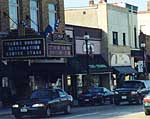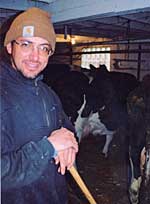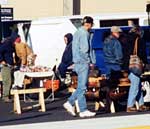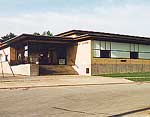Viroqua saves its soul
By Rob Schmitz
Minnesota Public Radio
December 10, 2001
|
| RealAudio |
Fifteen years ago, western Wisconsin's Vernon County was in economic trouble. The region's most important businesses, small dairy farms, were forced out by larger corporate farms. Boarded-up storefronts lined the main street of the county seat, Viroqua. The city's businesses were suffering from the recent arrival of Wal-Mart. Since the early '90s, the county has made a comeback by transforming its identity.
| |
|
|
|
||
Viroqua - population 4,200. It lies among the bluffs and fertile valleys of the winding Kickapoo River, one of the most remote regions of Wisconsin. Its geography has consistently made it one of Wisconsin's poorest regions. But in the last 10 years, isolation has brought benefits.
At the Magic Cabin Dolls workshop, an employee cuts pastel-colored cotton fabric. It will become a dress for a stuffed doll.
Sarah McDonald created Magic Cabin Dolls. She came to Viroqua with her husband and two children 10 years ago to start her own business. She brought her family here from a Twin Cities suburb because she wanted the small town life. Her timing was perfect.
Area farmers were in the depths of a farm crisis. They were desperate to get out of the region, and were selling off land to the first takers. McDonald says many new families moved to the area, and they were a little different from the area's long-time residents.
"They're not necessarily going to the Lutheran church in town. They're possibly more educated. They're not necessarily going to the public school, they're maybe more concerned with the ecology and environment. Bleeding-heart liberals? Does that work?" she laughs.
McDonald and some of her new neighbors enrolled their children in Pleasant Ridge School. It's a private alternative school in Viroqua run by the Waldorf School. The Waldorf School emphasizes spirituality and encourages students to act locally to change their world.
"A lot of people come to a point in their lives where they say, 'I don't want to raise my children in a city.' They have their roots here, and then they look around,and see there's an alternative school here that points to a broader community," says McDonald. "Maybe there's more options there, there's less judgement. That it's not your typical small town."
| |
|
|
|
||
McDonald chose Viroqua as the home for her small mail-order business. Now Magic Cabin Dolls has 20 local employees. Its profits have grown 1,500 percent in the last five years, successful enough to be sold off.
It is one of many recent economic successes in the area. Since 1989, Viroqua has seen 56 new businesses start up. They've created more than 150 new jobs.
Close to $13 million in public and private investment. That's not bad for a town of 4,000 people.
Fred Nelson owns a hardware store in town. He remembers what main street looked like 14 years ago.
"Coast to Coast was boarded up. Theater was closed down. JC Penney, boarded up. A couple of others that were empty - looked grim," says Nelson.
That was right after Wal-Mart came to town. In 1986, Wal-Mart announced it was going to build its fourth Wisconsin outlet in Viroqua. Nelson had never heard of Wal-Mart. He did some research on the company. He learned Wal-Mart offered the same products he offered for a fraction of the price.
In order to coexist and survive, he revamped his store and supplied it with products Wal-Mart didn't offer. He broadened his store's electrical and plumbing supplies, and expanded the store's lawn and garden department.
However, Nelson says, some business owners in town didn't follow his example, and within a year, five prominent downtown businesses had closed shop.
That same year, Nelson brought fellow business owners together. He convinced them to take advantage of business consulting, paid for by the state of Wisconsin. They learned how to conduct market surveys and how to enhance the aesthetics of Main Street.
| |
|
|
|
||
Now, 12 years later, the area's non-farm employment has increased four times faster than its population. Nelson says state help was a big factor in Viroqua's revitalization, but there was something bigger.
He tells the story of New Richmond, Wis., to illustrate what he means. He says some years back, New Richmond had a chance to get a Honeywell plant. But in the end, Honeywell decided to locate its plant elsewhere.
After the decision, Nelson says, the president of Honeywell explained to New Richmond's mayor why they decided against the town.
"'Unknown to you, we sent some of our corporate execs to your town. And what we saw were a bunch of boarded-up storefronts, a bunch of weeds growing downtown, a lot of trash lying around downtown - just not a very attractive site at all,'" Nelson relates. "'What it told us is - this is not a city that has pride in itself.'"
Nelson says Viroqua has community pride. He says it comes from a mix of ideas from long-time residents and newcomers, who have given new life to the area's economy.
Ten miles away from Viroqua, Paul Deutsch is introducing his dairy cows. "That's Percy, this one's Gertrude, that one's Emma." He says treating his cows like employees is important.
It may sound silly, but he names his cows because he considers them his business partners. Deutsch came to Vernon county five years ago with a dream to start an organic dairy farm. He and his 22 bovine employees are members of the Coulee Region Organic Produce Pool, or CROPP.
CROPP started in 1988 by farmers disillusioned by conventional farming and the difficulty of running family operations. CROPP's founders decided to try their hand at a growing niche market. It turned out to be a smart gamble.
| |
|
|
|
||
Thirteen years later, CROPP, known to consumers as Organic Valley, is the largest organic food cooperative in North America. Its headquarters remain just west of Viroqua, in the small town of La Farge.
Over the past four years, CROPP's sales have increased by about 50 percent each year. Many farmers in Vernon County are CROPP members, and for good reason. For example, Deutsch earns 25 percent more off of organic milk than traditional dairy farmers make.
CROPP uses traditional farming and progressive marketing strategies. This mixture of the old and the new has brought together different generations of farmers. They share ideas and make money.
Deutsch says CROPP allows area farmers much more control over the price they'll receive for milk than conventional farmers. Deutsch thinks this type of local control spills over to all facets of rural life, and is a big reason why people come to Vernon County.
"Most of the people I've talked to here from Chicago or the Twin Cities - it was the idea of community - searching for it. That and the concept that a rural life is a better life. A life they have more control over."
Deutsch cites examples of how this local control has been lost - conventional farming, where much of the money being made goes to an outside corporation. His second example is an obvious one for many in the region.
"Wal-Mart is notorious for crushing communities. Because they move it all into one place and it all becomes one brand loyalty, whereas 15 or 20 businesses were doing what they're doing now in one place," says Deutsch. "What I think gets forgotten is those 15 or 20 businesses were probably 15 to 20 families, that had kids and had provided for several generations."
Two years ago, Viroqua's Wal-Mart moved across the street to a new building. It's now a Wal-Mart Supercenter. The business community braced itself for another Main Street fallout. They worried another chain retailer would move into Wal-Mart's old building. But two years later, the big box stands empty, still for sale.
More Information



